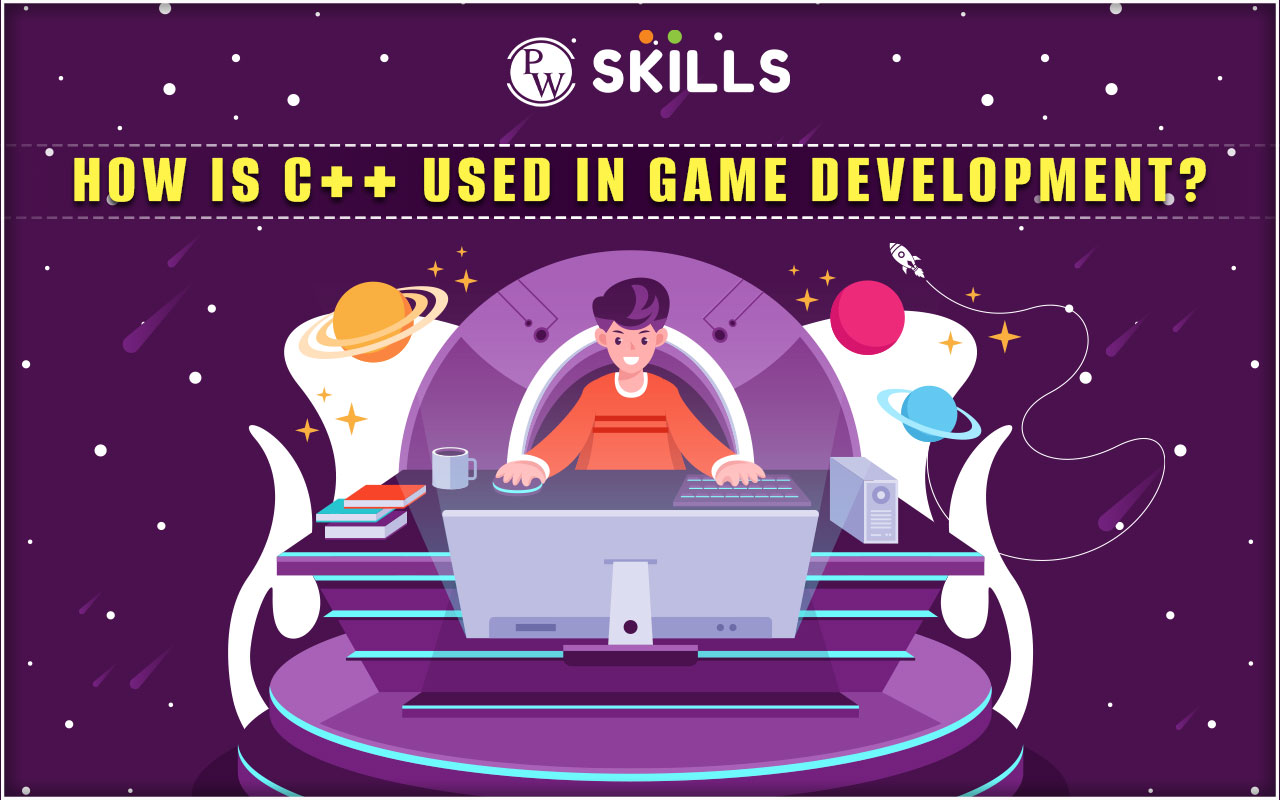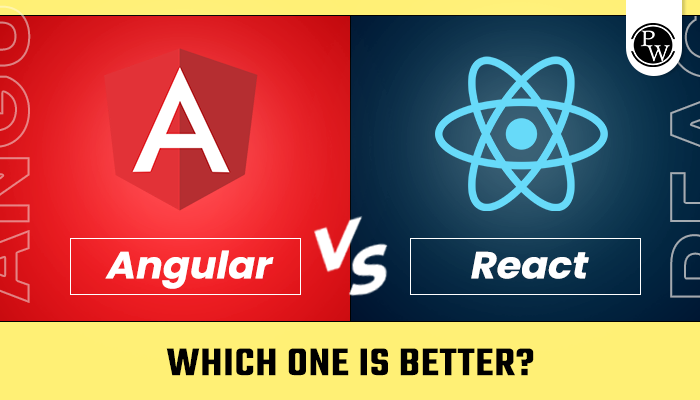C++ game development is widely used, and several resources can help you learn and apply it. C++ with DSA Course by Physics Wallah is the best course to sharpen your data structures and algorithms.
C++ Game Development: For decades, C++ has been the cornerstone for professional game developers, enabling the creation of high-performance games that transcend platforms such as Android, Mac, Windows, Linux, and more.
Its versatility extends to 2D and 3D game development, making it a preferred choice for building robust game engines. Notably, industry-leading engines like Unreal Engine leverage C++ as their scripting language, underscoring its significance in crafting complex and visually stunning gaming experiences.
While Unity Engine predominantly uses C#, the runtime language for Unity games is C++, reinforcing the language’s prevalence in the gaming landscape. Currently, most gaming application programming interfaces (APIs) are coded in C++, harnessing its flexibility for low-level components while maintaining the efficiency of compiled machine code.
Although writing C++ code may demand more time, the payoff lies in its unparalleled performance. Investing time in mastering the fundamentals of C++ in game development is a strategic endeavor.
This foundational knowledge not only empowers developers to create high-performance games but also aids in selecting proficient C++ game developers on platforms, ensuring a blend of expertise and experience.
Also read: Who And When C++ Developed By?
What is C++?
C++ stands out as a high-performance programming language renowned for its object-oriented paradigm. Particularly acclaimed for developing large-scale products, C++ is an extension of the C language and lays the foundation for languages like Java.
While C++ influences Java, the latter is specifically optimized for the seamless distribution of program objects across the internet and similar networks.
Compared to Java, mastering C++ entails a slightly steeper learning curve, demanding a substantial investment in training and study. Despite its complexity, C++ continues to evolve, with the latest version incorporating object-oriented, standard, and functional features and proficiency in low-level memory management.
Is C++ a suitable choice for software development? Absolutely. The language was conceptualized with integrated, resource-constrained software and versatile system development in mind. Its flexibility makes it applicable across various software development projects, showcasing its effectiveness in creating products such as servers, video games, space probes, and more.
Recommended Technical Course
- Full Stack Web Development Course
- Generative AI Course
- DSA C++ Course
- Java+DSA 1.0 Course
- Data Analytics Course
- Data Science with ML 1.0 Course
C++ Game Development Roadmap
Embarking on the journey of C++ game development requires a structured roadmap to guide you through the intricate world of creating interactive and engaging games. Whether you’re a novice or an experienced developer, this roadmap outlines the key milestones and skills to master for a successful venture into C++ game development.
1) Foundations of C++ Programming:
- Objective: Establish a solid understanding of C++ fundamentals.
- Key Topics:
- Variables, Data Types, and Operators: Learn to declare variables, understand different data types, and utilize operators for operations.
- Control Flow (Loops and Conditionals): Master control structures like loops (for, while) and conditionals (if, switch).
- Functions and Classes: Grasp the concepts of functions and classes for code organization and reusability.
- Memory Management in C++: Understand memory allocation and deallocation using new and delete operators.
- Pointers and References: Explore the intricacies of pointers and references, which are crucial for memory manipulation.
2) Introduction to Game Development Concepts:
- Objective: Familiarize yourself with basic game development principles.
- Key Topics:
- Game Loop and Event Handling: Comprehend the fundamental structure of game loops and handle events within them.
- Input Handling: Learn how to capture and process player input.
- Collision Detection: Understand techniques for detecting collisions between game objects.
- Basic Physics in Games: Introduce gravity, acceleration, and basic motion concepts.
3) Graphics Programming with OpenGL:
- Objective: Learn to render graphics and create visually appealing games.
- Key Topics:
- Introduction to OpenGL: Understand the basics of OpenGL, a widely used graphics library.
- Setting up a Graphics Window: Implement a window to display graphics.
- Basic Drawing and Shading: Explore techniques for drawing basic shapes and applying shading.
- Textures and Lighting: Enhance visual appeal by incorporating textures and lighting effects.
4) Game Design Patterns:
- Objective: Understand commonly used design patterns in game development.
- Key Topics:
- Singleton, Factory, Observer Patterns: Learn about design patterns to enhance code organization and flexibility.
- Component-Based Architecture: Explore the advantages of structuring games using components.
- State and Command Patterns: Implement patterns for managing different game states and commands.
5) Audio Programming:
- Objective: Integrate audio elements into your games.
- Key Topics:
- Introduction to Audio Programming: Understand the basics of working with audio in games.
- Playing Sound Effects and Music: Implement mechanisms for playing sound effects and background music.
- Managing Audio Assets: Learn how to handle and optimize audio assets.
6) Advanced Graphics and 3D Programming:
- Objective: Explore advanced graphics and delve into 3D game development.
- Key Topics:
- Advanced OpenGL Techniques: Dive deeper into OpenGL to implement advanced graphics rendering techniques.
- Shader Programming: Understand and utilize shaders for more sophisticated visual effects.
- Introduction to 3D Graphics: Transition from 2D to 3D game development, including concepts like rendering and modeling.
7) Physics and Simulations:
- Objective: Implement realistic physics and simulations in your games.
- Key Topics:
- Rigid Body Dynamics: Understand and simulate the movement of rigid bodies in your game.
- Collision Response: Implement responses to collisions between game objects.
- Particle Systems: Create dynamic visual effects using particle systems.
8) Game Engine Development:
- Objective: Gain insights into building your game engine.
- Key Topics:
- Entity-Component Systems: Structure your game engine using an entity-component architecture.
- Scene Graphs: Manage and optimize game object hierarchies for rendering.
- Asset Management: Develop systems for efficiently handling game assets.
9) Networking in Games:
- Objective: Learn the essentials of multiplayer game development.
- Key Topics:
- Socket Programming: Understand the basics of networking through socket programming.
- Client-Server Architecture: Implement client-server systems for multiplayer interactions.
- Multiplayer Game Design: Address challenges and strategies specific to designing multiplayer games.
10) Deployment and Optimization:
- Objective: Prepare your game for release and optimize performance.
- Key Topics:
- Packaging and Distribution: Learn the steps in packaging and distributing your game.
- Performance Optimization Techniques: Optimize your game for speed and resource efficiency.
- Debugging and Profiling: Master tools and techniques for debugging and performance profiling.
This comprehensive roadmap takes you from the foundational elements of C++ and game development to advanced topics and encourages a continuous learning mindset to stay relevant in this dynamic field. Happy coding!
Also read: C++ For Kids- Learn Programming in The Fun Way
C++ Game Development Libraries
Below is a table listing some popular C++ game development libraries, along with brief descriptions of their key features:
| C++ Game Development Libraries | |
| Library | Description |
| SFML (Simple and Fast Multimedia Library) | A simple and user-friendly library for 2D game development. SFML provides modules for graphics, windowing, audio, and network functionality. |
| OpenGL (Open Graphics Library) | A widely-used open standard for 3D graphics rendering. |
| SDL (Simple DirectMedia Layer) | A cross-platform development library designed for multimedia tasks, including graphics, windowing, audio, and input. |
| Cocos2d-x | An open-source game development framework that supports both 2D and 3D game development. |
| UE4 (Unreal Engine 4) | A powerful and widely-used game engine that supports both 2D and 3D game development. |
| Qt Game Development (Qt GameEnabler) | Based on the Qt framework, Qt GameEnabler is a collection of modules for game development. |
| Irrlicht Engine | A lightweight and open-source 3D game engine that supports C++. |
| Bullet Physics Library | A physics engine that can be integrated into C++ game projects to simulate realistic physics interactions. It is commonly used for games that require accurate physics simulations. |
| Boost.Geometry | A part of the Boost C++ Libraries, Boost.Geometry provides functionalities for geometric operations, making it useful for games that involve complex geometry and spatial calculations. |
How is C++ Used in Game Development?
C++ is widely used in game development due to its high performance, versatility, and low-level access to hardware resources. Here are several ways in which C++ is employed in the game development process:
1) Performance:
- Low-Level Access: C++ allows for low-level memory manipulation and direct access to hardware resources, enabling developers to optimize performance-critical code for speed and efficiency.
- Efficient Resource Management: Game developers have fine-grained control over memory allocation and deallocation, which is critical for managing resources like textures, models, and audio files efficiently.
2) Graphics Programming:
- OpenGL and DirectX: C++ is often used with graphics libraries such as OpenGL and DirectX to create visually stunning 2D and 3D graphics in games.
- Shader Programming: C++ facilitates the implementation of shader programs for advanced graphical effects, contributing to the overall visual appeal of games.
3) Game Engines:
- Unreal Engine, Unity, and Others: Major game engines like Unreal Engine use C++ as a primary scripting language. Developers can extend and customize game functionality by writing C++ code within these engines.
- Custom Game Engines: Many game developers build their custom game engines in C++, tailoring the engine to the specific requirements of their game projects.
4) Cross-Platform Development:
- Portability: C++ is known for its portability, allowing game developers to write code easily adapted to multiple platforms, such as Windows, macOS, Linux, and various gaming consoles.
5) Game Logic and AI:
- Efficient Algorithm Implementation: C++ is suitable for implementing complex algorithms efficiently, making it ideal for game logic and artificial intelligence (AI) systems.
- Multithreading: Games often require concurrent processes for handling AI, physics simulations, and rendering. C++ supports multithreading, enabling developers to implement parallel processing for improved performance.
6) Physics Simulations:
- Integration with Physics Engines: C++ seamlessly integrates with physics engines like Bullet or NVIDIA PhysX, allowing developers to create realistic physics simulations within games.
7) Networking:
- Multiplayer Games: C++ is commonly used for networking in multiplayer games, enabling the implementation of client-server architectures and facilitating seamless communication between game clients.
8) Audio Programming:
- Integration with Audio Libraries: C++ integrates with audio libraries, allowing developers to implement features like sound effects, music, and spatial audio within games.
9) Community Support and Legacy Code:
- Extensive Libraries: The C++ community provides a wealth of libraries and frameworks dedicated to game development, streamlining the development process.
- Legacy Codebases: Many existing game projects and engines are built using C++, making it essential for developers to be proficient in C++ to maintain and enhance legacy code.
C++ with DSA Course by Physics Wallah is ideal for learning C++ game development skills. This comprehensive course elevates your programming skills, equipping you with the expertise to bring your gaming visions to life seamlessly.
Why You Should Learn C++ for Game Development?
Here are some benefits of learning C++ for game development:
- Unreal Engine and Others: C++ is a primary scripting language in many widely used game engines, including Unreal Engine.
- Existing Libraries and Frameworks: C++ has a rich ecosystem of libraries and frameworks dedicated to game development, such as SFML (Simple and Fast Multimedia Library) and SDL (Simple DirectMedia Layer). These resources streamline development by providing pre-built functionalities.
- In-Demand Skill: Proficiency in C++ is highly sought after in the gaming industry. Learning C++ enhances your employability and opens doors to various roles in game development studios.
- Large Community: C++ has a large and active community of developers. Access to forums, tutorials, and open-source projects within the community ensures continuous learning and support.
- Transferable Skills: Learning C++ equips you with foundational programming concepts transferable to other languages. This versatility makes it easier to learn and adapt to new languages in the future.
Also read: Difference between C and C++
FAQs
Why is C++ commonly used in game development?
C++ is favored in game development for its high performance, low-level access to hardware, efficient memory management, and versatility. It allows developers to optimize code for speed and provides control over system resources.
Which graphics libraries are commonly used with C++ for game development?
C++ is often paired with graphics libraries such as OpenGL and DirectX for creating visually stunning 2D and 3D graphics in games. These libraries provide interfaces for rendering graphics on various platforms.
Are there any specific C++ libraries for game development?
Yes, there are several C++ libraries dedicated to game development. Some examples include SFML (Simple and Fast Multimedia Library), SDL (Simple DirectMedia Layer), and Boost.Geometry for geometric operations.
Is C++ suitable for indie game development?
Yes, C++ is suitable for indie game development. Its performance and versatility make it a viable choice for creating games independently. Many successful indie games have been developed using C++.
How can I optimize C++ code for game development?
Optimization techniques include:
Efficient memory management.
Using algorithms with low time complexity.
Leveraging multithreading for parallel processing.
Profiling tools can identify performance bottlenecks.




